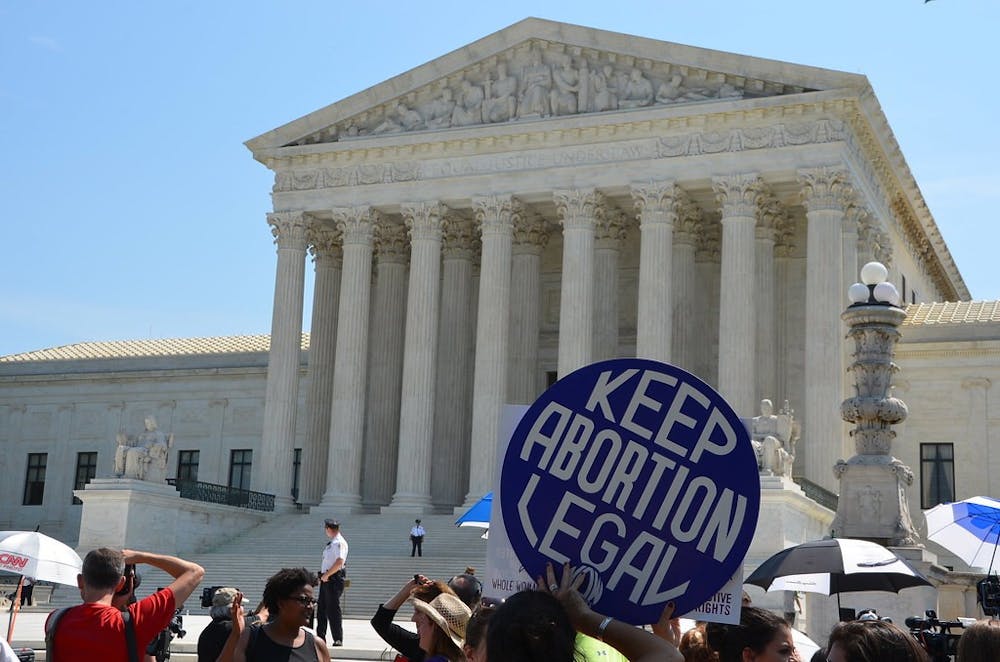On Wednesday, Sept. 1, a new Texas abortion law went into effect. The law bans abortions at the point when a fetal cardiac activity can be detected — an event that occurs approximately five to six weeks into pregnancy. Despite the 1973 Supreme Court decision Roe v. Wade, which established an affirmative constitutional right to the procedure, citizens across the state will now be prevented from seeking one before they may even know that they are pregnant. The enforcement of such a law, as well as its failure to be challenged thus far on a legal basis, shows the ongoing necessity of vigilant advocacy for reproductive rights, and acts as a harrowing reminder of the fragility of liberties that were so arduously won.
The new Texas abortion law provides yet another example of the unreasonable and burdensome expectations placed on those capable of getting pregnant to not only be solely responsible, but also potentially punished, for their reproductive capacities. It is important to understand that this cardiac activity that the lawmakers draw their justification from may not even consist of a heartbeat, as the heart is not fully formed at this stage. Most are not even aware they are pregnant at the six-week mark, given that the length of a full cycle is four weeks. Even if an individual who had fallen pregnant decided to obtain a pregnancy test after missing their period, they would have a mere two weeks to make a rather momentous decision about whether to go ahead with the pregnancy, find a clinic to undergo the procedure in the case that they decide against moving forward with it, and gather the funds necessary to pay for an abortion.
This law exposes not only an unwillingness to alleviate the burden of those capable of getting pregnant, but is also an active intent to push vulnerable individuals into positions of immense financial hardship or emotional and psychological anguish. The law makes no exceptions for victims of rape or incest, and only allows an extension of the established timeframe for people at clear and obvious risk of life-threatening harm — a very narrow criterion. Those who cannot raise the funds to undergo the procedure within the tight six-week frame, or simply are not financially able to support a child, are similarly left vulnerable by a law that provides no safety net for the underprivileged.
Finally, this law exposes cracks in the legal system, proving that even the 1973 Supreme Court decision Roe v. Wade, which supposedly affirms a constitutional right to abortion, is fallible. While Roe v. Wade prohibits states from prohibiting abortions before “fetal viability” — something that does not occur until around the 22-week mark, when the fetus can “exist outside the womb” — this law prohibits abortions after just six weeks.
Furthermore, this law reveals the legal system’s inability to protect constitutional rights. It calls upon the citizens of Texas to sue anyone who aids or abets an abortion, including clinics, doctors, even the Uber driver who provides transportation to the individual seeking the procedure. By making citizens the enforcers of the law rather than labeling abortion a state crime, politicians have effectively worked around the precedent set by Roe v. Wade.
The enforcement of this law, as well as the Supreme Court’s failure to block it, demonstrates that certain constitutional rights are still not assured. It demonstrates the necessity for activism, for members of our own Princeton community, although not explicitly being affected by the Texas law themselves, to advocate for these rights. We need to engage with student groups such as Princeton Students for Reproductive Justice (PSRJ) and place pressure on our local representatives to support policies that ensure reproductive rights. This type of lawmaking is a slippery slope — the successful enforcement of one law opens the door for many more legal challenges to Roe v. Wade, signifying that an individual’s right to make choices about their own body remains something we must repeatedly attempt to affirm.
Claudia Frykberg is a senior in the English Department. She can be reached at frykberg@princeton.edu.








